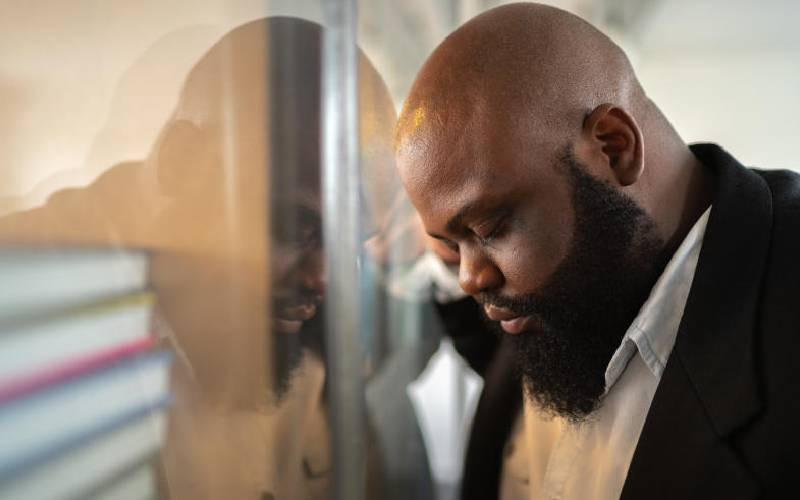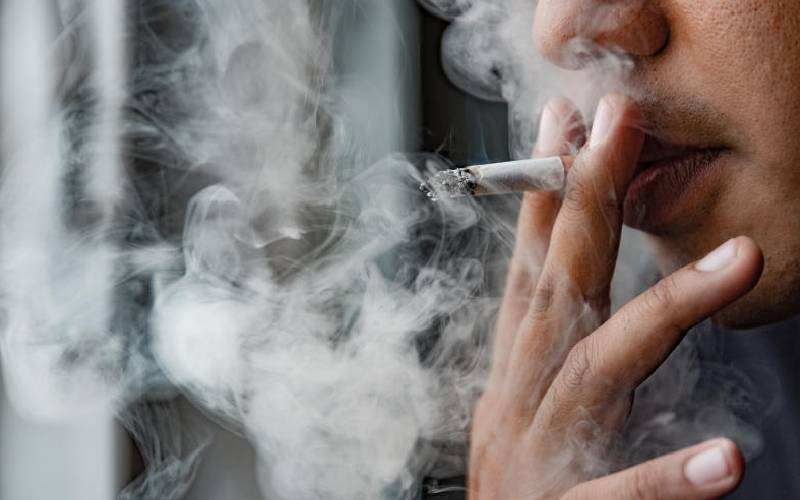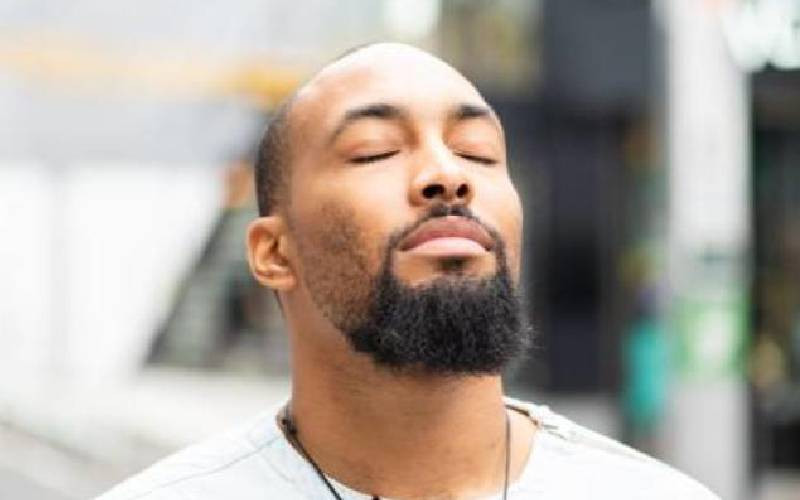
It’s 11am in Machakos when I meet 33-year-old Mohammed Mwinyimsa as he installs a WiFi connection at a neighbour’s home just a few steps from his own. It’s part of his daily hustle—how he earns a living and supports his family. But today, even as he works, Mohammed seems distracted, distant and heavy-hearted.
A father of three, Mohammed is now raising only two children. His firstborn died in 2016, a painful memory he carries quietly. Watching him move between tangled cables and blinking routers, I ask what’s weighing on him. After a long pause, he begins to share his story.
“I was born in Mombasa, the first of five children. My father died in 2012, so my mother raised us after that,” he says, adding, “I studied electrical engineering, but at 20, I rushed into marriage after my girlfriend got pregnant. That upset my parents, I still regret how fast it all happened.”
Though they officially tied the knot in 2019, the couple had already experienced heartbreak. “Before our wedding, we lost our first child. I don’t even like talking about it. Then came our second child in 2019, and another in 2022. That’s when life really became difficult.”




At the time, Mohammed worked as an electrician. The pay, he says, was barely enough. “Before I had children, I would send my mother money. But after starting a family, I had to reduce the amount. That caused problems. My mum started accusing me of neglect: ‘Go enjoy your money with your wife,’ she’d say, and not kindly.”
The emotional weight began to take its toll. “They say men shouldn’t cry, but I did. Like a baby. My wife could see something was wrong. It’s hard to be strong, to provide for your family, and then be insulted by your own mother.”
Mohammed began locking himself in a room just to cry. “I had constant headaches. I earned Sh6,000 to Sh8,000 a month, barely enough to live on. I still tried to send Sh2,000 to my mum, but the insults didn’t stop. My wife supported me, but when we had our third child in 2022, I lost my job. I thought a baby would bring blessings. Instead, life got tougher.”
With no job and rising responsibilities, he hit rock bottom. “My children were hungry. I was so desperate I even considered joining a cult, thinking maybe it would bring money. I couldn’t pay school fees. I regretted getting married so young.”
Home life grew tense; “My wife, who once stood by me, started demanding money I didn’t have. I cried daily. I prayed. I tried everything.”
According to mental health expert John Wanjiru, Mohammed’s story is far from unique. “For years, Kenyan men have been told their worth lies in what they can provide. But what happens when a man loses his job? Does he stop being a man, or even human? Many collapse under pressure, but in silence, because society teaches them: ‘Real men don’t cry,” Wanjiru asks.
Men don’t cry
Using his electrical skills, Mohammed turned to installing WiFi networks to survive, but business is slow. “I’ve only told my brother what I’m going through. In our culture, men crying is shameful. But I’ve learnt opening up helps. I urge other men: talk to someone you trust.”
Mohammed’s struggle echoes that of 45-year-old John Gathitu, a teacher from Kiambu who has lived with bipolar disorder for nearly two decades.
Stay informed. Subscribe to our newsletter
“I was first diagnosed while working abroad. I had just landed a great job, but the excitement triggered a manic episode. I became psychotic, lost the contract, and was deported,” John shares.
Back in Kenya, he got a job through the Teachers Service Commission (TSC). “I had done everything right, went to university, got a good job. Then bipolar hit, and everything changed.”
For 18 years, John has battled the condition. “I’ve been admitted to hospitals in Kiambu, Mathare, and Chiromo. When I relapse, I completely disconnect from reality.”
In 2008, he married a fellow teacher. They had three children together. But 14 years later, the marriage collapsed. “My condition was too much for her to handle,” he admits.
He vividly remembers one of his worst episodes. “Last April, I was manic. A hospital refused to admit me because I looked ‘normal’. A few days later, I was wandering the streets of Nairobi, naked.”
His symptoms include erratic spending, irritability, extreme generosity, and mood swings. “People don’t see the illness. There’s no crutch, no cast. But it’s there, every day.”
John has embraced his reality and speaks about it openly. “Bipolar can’t be cured—you manage it. I’m part of support groups, such as Users and Survivors of Psychiatry. But the mental health system here is broken. We have too few psychiatrists. Many hospitals have drugs, but no professionals to guide you.”
He takes medication, including Tegnetol, but struggles with the side effects. “Memory loss, weight gain—it’s rough. I sometimes skip doses during the week because I need to teach and think clearly.” Despite the challenges, John has no illusions. “Employers won’t hire you out of sympathy. They want performance. I’ve lost friends who don’t understand my actions when I’m unwell. But this is my reality.”
Asked if he believes he’ll ever live a “normal” life again, John is clear. “No. Bipolar is permanent, but it can be managed. I’m in Facebook groups, such as Bipolar in Me. If you’re struggling, join us. You’ll find community, and hope.”
Subtle signs
Experts define mental health as a state of well-being, the ability to navigate life’s pressures, recognise one’s abilities, work productively, and contribute to society.
Wanjiru describes how declining mental health often shows up in subtle, but telling ways: sleeping too much or too little, lack of intimacy, loss of interest in previously enjoyable activities, withdrawing from children, snapping over minor issues, and a home that feels more like a battlefield, or worse, a silent grave. “This isn’t just stress,” he explains. “It’s the beginning of a mental health crisis. Suppressing emotions isn’t strength, it’s a slow death. Studies show men who don’t express emotion are at greater risk of heart disease, addiction, and even suicide.”
Globally, one in ten men suffers from depression or anxiety, but fewer than half seek help. Men are four times more likely to die by suicide than women, and they lead in alcohol-related deaths and substance abuse, according to the World Health Organisation (WHO).
In the U.S., more than six million men face depression every year, yet 49 per cent admit they feel far worse than they reveal. In Kenya, the problem is magnified by cultural silence and stigma. Despite WHO’s estimate that 264 million people globally live with depression, societal norms around masculinity deter many Kenyan men from opening up.
Kenya’s mental disorder prevalence stands at 4.4 per cent, with common diagnoses including depression, anxiety, PTSD, and substance abuse. Men account for 80 per cent of suicide cases, four times more than women. The Kenya Red Cross reports that 40 per cent of Kenyan men have never discussed their mental health with anyone.
Kenya’s suicide rate stands at six per 100,000 people, yet without a national suicide registry, prevention efforts remain limited.
In October 2023, Kenya was rocked by a string of tragic suicides: a police officer shot himself in his car, a woman jumped from a building, a man burned himself alive, and Kilifi County reported 10 suicides in two months. Economic hardship, unemployment, and overwhelming expectations push many to the edge, but too many men suffer in silence.
Seek help
As we observe Men’s Mental Health Month, the personal struggles of individuals, such as Mohammed and John remind us that behind every statistic is a real human being.
We must encourage men to seek help, reduce stigma, and improve mental health services. No one should have to suffer in silence.
“It’s not just Men’s Mental Health Month—it’s about the emotional well-being of an entire nation,” says Wanjiru. “Men’s mental health impacts everyone. Behind rising crime, domestic violence, and family breakdowns lies a deeper issue: men under unbearable emotional pressure. It’s not just strangers—it’s the father, the husband, the brother who’s grown quiet.”
He adds: “A man in crisis still shows up, he works, smiles, and goes through the motions. But inside, he’s falling apart. The weight of financial burdens, family obligations, and societal expectations becomes unbearable. Depression often looks like irritability. Anxiety masks itself as overworking or distraction. He becomes emotionally distant, withdrawn, angry.”
“To the men drowning in silence: you are not weak, and you are not alone. There is no shame in saying, ‘I need help.’ There is no pride in ‘kujikaza’—pushing through until you break. The world has already demanded too much. Don’t let it steal your mind too. Let’s rewrite the narrative, through one conversation, one safe space, one brave step at a time.”
Wanjiru concludes with a call to action: “The true measure of a man isn’t in how much he provides, but in the quality of his life and relationships. Healing begins at home. Mothers, wives, siblings, notice the silence. Ask: ‘How are you really doing?’ Create a home where tears are sacred, not shameful. At the societal level, let’s normalise therapy for men. We need spaces—group therapy, peer mentorship—where a man can say ‘I’m not okay’ and still feel like a man.”